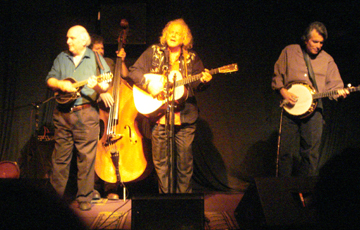
Peter Rowan, second from right, on stage with his band, mandolinist Jody Stecher, bassist Paul Knight and banjo player Keith Little, June 8 at the Blue Loon, Fairbanks, Alaska
To call Peter Rowan a bluegrass musician would be to ignore the diverse background and unique musical occurrences that have punctuated a nearly 50-year performance career. Rowan may have landed his first break as a Bluegrass Boy with Bill Monroe, but that relationship lasted only a couple years before Rowan connected with David Grisman to form Earth Opera and begin a run of bluegrass/folk/psychedelic/rock bands that challenged musical boundaries.
While that is far too much ground for Rowan to cover in one concert, and his stated intention was a focus on old-time bluegrass and gospel, Rowan and company—mandolinist Jody Stecher, bassist Paul Knight and banjo player Keith Little—did manage to pull forth a trio of late-second set crowd-pleasers from Old and In the Way: “Panama Red,” Midnight Moonlight” and “Pig in a Pen.”
But the show began on a mellower note with a good number of songs from the band’s recent album, Legacy, as well as some old traditional numbers from the Stanley Brothers and Bill Monroe. There was a haunting nature to many of the songs, sad laments and sorrowful tales, and momentum was slow to build.
But Rowan, looking something like a wild ’60s castoff with a disheveled mane of white hair (including a small feather on the left temple), red face and decorative cowboy shirt (at first this review thought it was David Lindley coming on stage), stepped it up a notch on “Jailer, Jailer” (from Legacy ), singing with an intensity and inflection that got the crowd dancing.
While the bulk of the set was quieter tunes, what really stood out was the lack of standard amplification—that is, plugged in instruments. The band harmonized into one older-style microphone or stepped up to floor mics to boost the instrumentation. The musicians also demonstrated a fluidly on stage underscoring a lifetime of performance, subtly repositioning themselves around that mic or stepping back as required. The combined result was a more original and earnest feeling to the songs being performed in a style fitting the early days of bluegrass.
Additionally, solos, while present, were typically short and tasteful, a simple compliment to the songs whole and not the place for showboating. It was a welcome change to many of the over-amped and everyone-take-a-solo-every-song bluegrass acts touring today.
Rowan’s casual banter between songs was also fun, whether joking about the endless Alaska daylight or oddly discussing the merits of “Treasure Island” and talking in pirate speak. This trait proved especially useful two songs into set two when he broke a string. While Stecher kindly ran to the dressing room to retrieve a replacement, Rowan launched into the tale of “The Free Mexican Airforce,” relishing in his early-70s counter-culture moments. The unplanned number went over well, even as Rowan struggled to change the string, with Stecher eventually taking charge and inquiring to the audience, “How many bluegrass musicians does it take to change a guitar string?”
The second set continued in a more up-tempo manner on the whole with “The Raven” and “The Night Prayer” (dedicated to the Dali Lama) as a center piece, and the occasional traditional number to cool things off a touch. The set closed with the Old and In the Way song trio mentioned above, spliced with rousing snippets of “Not Fade Away” and “Hey, Bo Diddley.”
The encore brought the performance full circle, with several traditional numbers easing Rowan and his bluegrass band off stage in style.


No Comments comments associated with this post